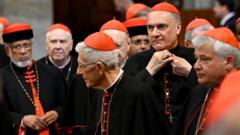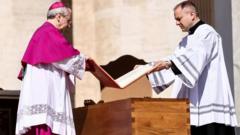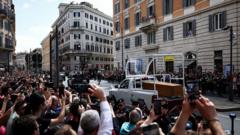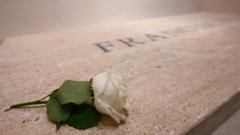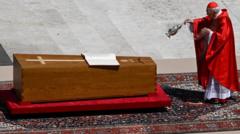With Pope Francis’ passing, the role of the next pope is more vital than ever, and the unpredictability surrounding the conclave adds a fascinating layer to the wait. This conclave, set to convene in the Sistine Chapel, will see cardinals, with a significant proportion being the Pope’s own choices, engaging in deliberation and voting. Notably, the global representation within the College of Cardinals has changed dramatically; for the first time, less than half are from Europe, which may influence the outcome. Candidates from Africa, Asia, and different experiences within church governance are in the spotlight, prompting questions about the direction of the Church amidst ongoing social challenges.
### The Race for the Papacy: Key Contenders in Uncharted Territory

### The Race for the Papacy: Key Contenders in Uncharted Territory
As the Catholic Church faces a pivotal moment, speculation grows around who will succeed Pope Francis, with unique factors shaping the election process.
The cardinals gearing up for the election include:
**Pietro Parolin (Italy, 70)**: As the former Secretary of State under Pope Francis, Cardinal Parolin is viewed as a frontrunner despite criticism regarding his diplomatic leanings in the face of Church dogma.
**Luis Antonio Gokim Tagle (Philippines, 67)**: Known for advocating compassion towards marginalized groups, Cardinal Tagle is dubbed the "Asian Francis" and is revered for his grassroots approach to Church leadership.
**Fridolin Ambongo Besungu (Democratic Republic of Congo, 65)**: A strong conservative voice, Cardinal Ambongo supports traditional values while advocating for interreligious dialogues amidst regional tensions.
**Peter Kodwo Appiah Turkson (Ghana, 76)**: A former favorite for the papacy, this influential figure is known for his dynamic personality and conservative stance, although he has opposed the criminalization of homosexuality.
**Peter Erdo (Hungary, 72)**: A seasoned strategist in Church affairs, Cardinal Erdo has shown leadership during critical moments but holds traditional views that fuel both admiration and criticism.
Additional notable candidates include **Angelo Scola (Italy, 83)**, **Reinhard Marx (Germany, 71)**, **Marc Ouellet (Canada, 80)**, and **Robert Prevost (USA, 69)**, offering a diverse breadth of views and leadership styles.
While the conclave’s dynamics create uncertainty, the potential for a pope from outside Europe marks a historical shift—signifying a broader representation of the Catholic faithful. Each candidate brings a unique perspective to a Church navigating significant global issues.
The upcoming votes will certainly be closely watched; the implications for the Catholic Church will resonate far beyond the conclave's walls, directly impacting its 1.4 billion adherents worldwide. The discussions in the Sistine Chapel are not just about doctrine but reflect the Church's ability to engage with a rapidly changing world.
With their futures at stake, the cardinals must weigh tradition, compassion, and the challenges of modern society as they head into one of the Church's most crucial turning points.
**Pietro Parolin (Italy, 70)**: As the former Secretary of State under Pope Francis, Cardinal Parolin is viewed as a frontrunner despite criticism regarding his diplomatic leanings in the face of Church dogma.
**Luis Antonio Gokim Tagle (Philippines, 67)**: Known for advocating compassion towards marginalized groups, Cardinal Tagle is dubbed the "Asian Francis" and is revered for his grassroots approach to Church leadership.
**Fridolin Ambongo Besungu (Democratic Republic of Congo, 65)**: A strong conservative voice, Cardinal Ambongo supports traditional values while advocating for interreligious dialogues amidst regional tensions.
**Peter Kodwo Appiah Turkson (Ghana, 76)**: A former favorite for the papacy, this influential figure is known for his dynamic personality and conservative stance, although he has opposed the criminalization of homosexuality.
**Peter Erdo (Hungary, 72)**: A seasoned strategist in Church affairs, Cardinal Erdo has shown leadership during critical moments but holds traditional views that fuel both admiration and criticism.
Additional notable candidates include **Angelo Scola (Italy, 83)**, **Reinhard Marx (Germany, 71)**, **Marc Ouellet (Canada, 80)**, and **Robert Prevost (USA, 69)**, offering a diverse breadth of views and leadership styles.
While the conclave’s dynamics create uncertainty, the potential for a pope from outside Europe marks a historical shift—signifying a broader representation of the Catholic faithful. Each candidate brings a unique perspective to a Church navigating significant global issues.
The upcoming votes will certainly be closely watched; the implications for the Catholic Church will resonate far beyond the conclave's walls, directly impacting its 1.4 billion adherents worldwide. The discussions in the Sistine Chapel are not just about doctrine but reflect the Church's ability to engage with a rapidly changing world.
With their futures at stake, the cardinals must weigh tradition, compassion, and the challenges of modern society as they head into one of the Church's most crucial turning points.

